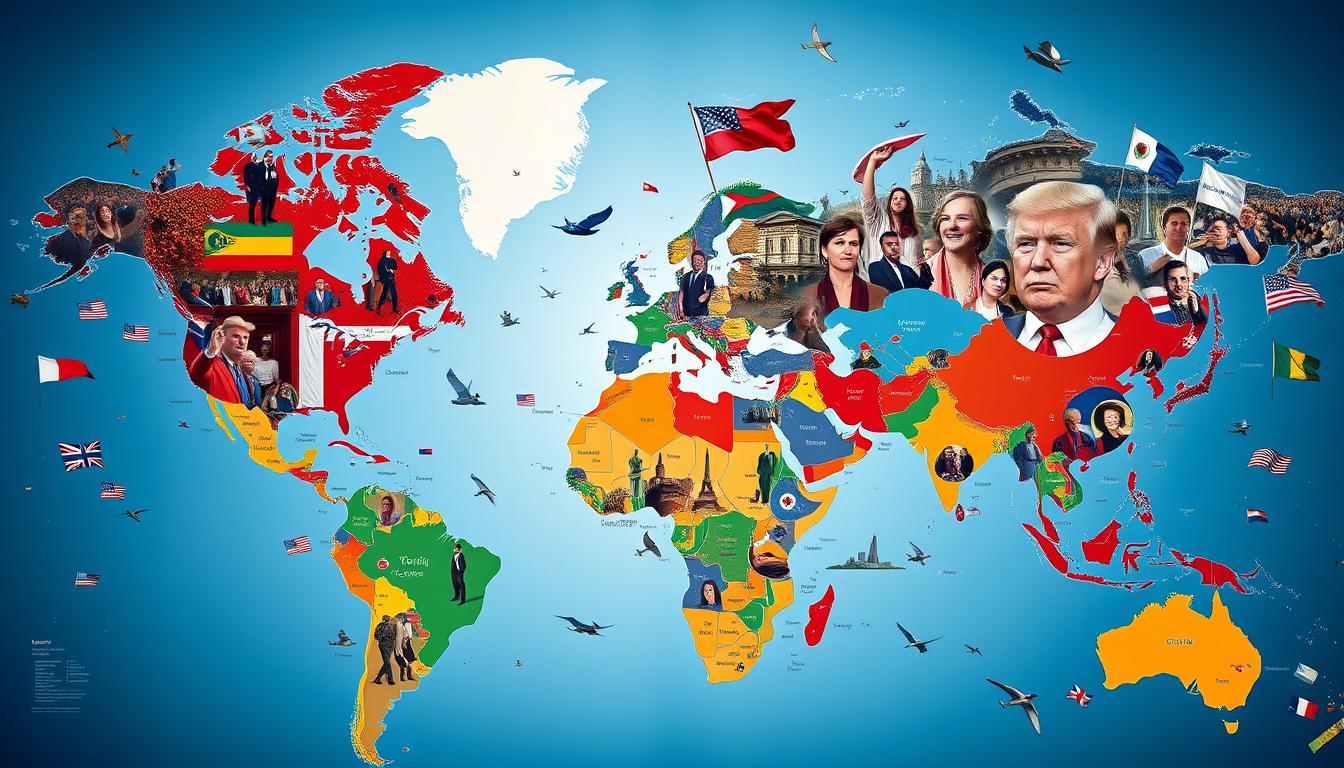About 20% of all goods exported from China go to the United States. This shows the deep economic ties between countries and highlights how changes in foreign policy can cause big disruptions. As I look into the effects of Trump’s victory on different countries, it’s clear how the Trump presidency would have significant implications for international relations. has changed international relations and caused global worries. Trump’s “America First” policy has made a big impact on how countries interact with each other.
It’s important to understand the global impact of Trump’s policies, especially with the 2024 presidential election coming up. His approach could change trade and the way democracies work in many countries. Let’s see how his policies have affected the world and what it might mean for our future.
Understanding Trump’s Foreign Policy and Its Global Repercussions
The America First policy during the trump presidency marked a big change in U.S. foreign policy. It puts the national interest first, over traditional alliances and agreements. This change has had big effects, especially on trade and military actions around the world.
Overview of Trump’s “America First” Policy
Under the America First policy, the U.S. changed how it works with other countries. It focused more on one-on-one deals and less on group efforts. This led to pulling out of important agreements like the Paris Agreement and the Iran nuclear deal, showing a more isolated stance.
In April 2017, I saw the impact when Trump ordered missile strikes in Syria. This was a big change from his promise to reduce military actions. Then, in December 2018, he pulled troops out of Syria, raising worries about global stability.
Impact on International Relations and Alliances
Trump’s foreign policy sparked debate among friends and foes. The Trump effects on relationships with Europe were especially clear. His actions and words challenged long-standing diplomatic ways, especially with NATO and EU leaders.
Trump’s approach to world leaders was different from past U.S. presidents. He favored leaders like North Korea’s, and strained ties with European countries. This eroded trust in defense and economic partnerships, especially with threats from Russia growing.
| Policy Change | Date | Details |
|---|---|---|
| Missile Strikes in Syria | April 2017 | Authorized strikes against a military airfield, showing unexpected military engagement. |
| Withdrawal from Syria | December 2018 | Announcement of troop withdrawal, leading to Secretary of Defense’s resignation. |
| Deal with Taliban | February 2020 | Signed a deal for full troop withdrawal from Afghanistan. |
| Withdrawal from Paris Agreement | June 2017 | Reversed commitment to combat climate change. |
| Withdrawal from Iran Nuclear Deal | May 2018 | Abandoned the Joint Comprehensive Plan of Action. |
| Recognition of Jerusalem | December 2017 | Declared Jerusalem as Israel’s capital, provoking global reactions. |
| Withdrawal from TPP | 2018 | Exited from the Trans-Pacific Partnership. |
| Imposition of Tariffs on China | January 2018 | Initiated trade war that escalated through 2019. |
Effects of Trump Victory on Different Countries
The world can change a lot when the U.S. has a new president. Trump’s win changed many countries’ views on trade, security, and democracy.
Australia’s Response to Trump’s Trade Policies
Australia values its friendship with the U.S. But Trump’s trade ideas made things uncertain. Australian leaders wondered how this would affect their relationship with the U.S.
Many Australians didn’t trust Trump. They wanted Biden to win. This shows they were worried about the U.S. under Trump.
Australia likes open markets. But Trump’s trade plans made them question this, particularly in light of the upcoming US presidential election. It’s a big issue for Australia.
Impact on UK’s Security Relationship with the U.S.
The U.K. and U.S. have a strong bond, especially after Brexit. If Trump wins again, this bond might get shaky. The U.K. is worried about global conflicts, like the war in Ukraine.
Trump’s past actions in U.K. politics make things even more uncertain. The U.K. must balance its ties with Trump while keeping NATO strong.
Concerns in Europe About Democratic Values
Europe is worried about Trump’s possible win. It’s not just about the U.S. Nationalism is growing, which threatens democracy in Europe. Trump’s words make people doubt democracy.
The U.S. election is a test for democracy worldwide. Europe is watching closely. It shows how democracy is doing across the Atlantic.
| Country | Key Concerns | Impact on Relationship |
|---|---|---|
| Australia | Trade policies under Trump | Increased uncertainty in U.S.-Australia ties |
| UK | Security under Trump | Possible unpredictability in U.S. relations |
| Europe | Erosion of democratic values | Heightened anxiety regarding U.S. influence |
Economic Implications for Global Trading Partners
The Trump administration’s policies have changed the economic landscape. This includes the U.S. trade deficit and tariffs. These changes affect not just the U.S. but also global trading partners. It’s important to understand these effects to see how they impact the world.
U.S. Trade Deficit and Tariff Impacts on Various Nations
The U.S. trade deficit is a key focus of Trump’s economic policy. Tariffs on imports have played a big role. For example, tariffs on Chinese goods over $60 billion have changed trade rules.
Tariffs have made domestic industries more competitive. But, countries like China and others have retaliated. This has raised costs and strained relationships.
Tariffs have also made exports more expensive. This makes goods from countries like Singapore less competitive. Singapore’s exports are 174% of its total GDP, making it very sensitive to these changes.
Repatriation of Jobs and Its Global Consequences
Job repatriation is a big part of Trump’s policies. It aims to bring jobs back to the U.S. But, it has hurt the global labor market. Countries like Mexico and China have seen their economies suffer.
Job repatriation has far-reaching effects. It can lead to less foreign investment and changes in supply chains. Companies must adapt to stricter U.S. rules. This shift towards protectionism creates uncertainty in the international labor market.
Effects of Deregulation on International Trade Dynamics
The Trump administration’s deregulation aims to help U.S. businesses. But, it raises concerns about fairness in global trade. Countries with stricter rules face challenges, leading to new trade barriers.
Deregulation could fragment the global market. This could make international trade more complicated and unstable. The risk of Global Fragmentation is high, affecting not just the U.S. but also major economies like China.
| Country | Impact of U.S. Tariffs | Potential GDP Decrease | Trade Dependency (%) |
|---|---|---|---|
| China | Job losses in manufacturing | 0.5% in 2025, 0.5% in 2026 | 20.3% |
| Mexico | Shifts in production locations | N/A | 41.7% |
| Singapore | Increased export prices | N/A | 174% |
| EU countries | Retaliatory tariffs | N/A | 10.6% |
List of Major Countries and Effect of Trump’s Victory on Them
Thinking about a Trump win in 2024 shows how different countries will react. Each country has its own way of dealing with the U.S. This could change how countries talk to each other.
Canada might look to change its trade deals, especially with Trump’s USMCA. Mexico could face more pressure on immigration and tariffs, like before.
Germany might see new challenges, like more pressure on defense spending and NATO. China’s response is key; any trade conflicts could make things worse for U.S. businesses and people.
- Canada: Anticipating adjustments to trade and immigration policies.
- Mexico: Preparing for potential renegotiations on tariffs and immigration.
- Germany: Expected scrutiny over defense spending and NATO participation.
- China: Likely to fortify its stance amid renewed trade tensions.
The varied reactions from these big countries show how complex The shifts in global relations could be influenced by the outcome of the US presidential election and the potential for a Trump victory. are in the context of a possible Trump presidency. international relations are. Knowing how Trump’s victory could affect these countries helps us understand future global interactions.
Conclusion
The Trump election impact has deeply changed global relations and how the U.S. is seen around the world. From election night, when results were still up in the air, the world felt the effects. Countries started to adjust their plans, expecting changes from Trump’s “America First” approach.
This shift shows how important international cooperation is, even when things are uncertain.
Looking to the future, alliances and trade deals will play a big role. The U.K. and Australia have already seen changes in their partnerships. Trump’s policies have caused both worry and a sense of unity in Europe, as shown by a Eurobarometer survey.
This uncertainty makes us wonder if old ways can last and if nations can work together despite their differences.
In short, Trump’s presidency has brought big changes to international diplomacy. The world is watching and playing a part in shaping the future of global relations. It’s key to understand these complex interactions to build strong partnerships worldwide.
FAQ
Here’s an extended FAQ on “The Global Consequences of a Second Trump Presidency on International Affairs” with HTML formatting and highlighted terms:
1. What are the potential implications of a second Trump presidency on global trade?
A second Trump presidency could have significant implications for global trade. Based on his first term policies, we might expect: 1. Increased use of tariffs as a negotiating tool, potentially leading to trade wars. 2. A focus on bilateral trade deals rather than multilateral agreements. 3. Possible withdrawal from or renegotiation of existing trade pacts. 4. A “America First” approach to US trade policy, which could disrupt global supply chains. 5. Continued tensions with China over trade practices and intellectual property issues. These policies could lead to increased uncertainty in global markets and potentially slow economic growth in some regions, especially if a Trump victory would alter trade dynamics.
2. How might NATO and US-European relations be affected by a Trump victory in the 2024 presidential election?
A Trump victory in the 2024 presidential election could significantly impact NATO and US-European relations: 1. Renewed pressure on NATO allies to increase defense spending. 2. Potential reassessment of the US commitment to NATO’s collective defense principle. 3. Strained diplomatic relations with key European allies. 4. Possible reduction in US troop presence in Europe. 5. Increased skepticism towards EU institutions and policies. These changes could lead to a weakening of transatlantic ties and potentially embolden adversaries like Russia.
3. What would be the likely approach of a second Trump administration towards the ongoing conflict in Ukraine?
A second Trump administration might take a different approach to the Ukraine conflict compared to the current Biden administration: 1. Potential reduction in military aid to Ukraine. 2. A push for direct negotiations between Ukraine and Russia. 3. Possible easing of sanctions on Russia in exchange for concessions. 4. Less emphasis on supporting Ukraine’s territorial integrity. 5. A focus on US domestic interests over international involvement. This approach could significantly alter the dynamics of the conflict and potentially lead to a resolution that is less favorable to Ukraine’s current position.

